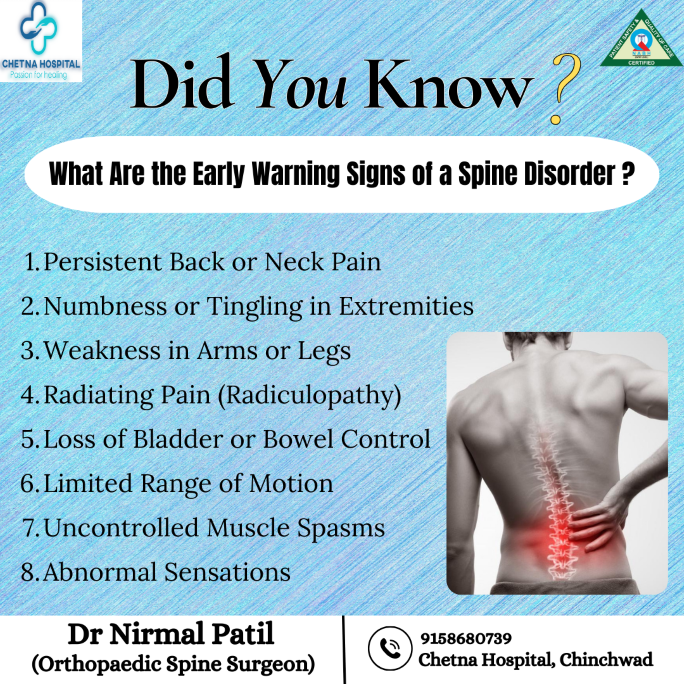The spine is a complex structure that plays a crucial role in our overall health and mobility. It supports the body, protects the spinal cord, and allows for a wide range of movements. However, spine disorders can develop due to various factors, including age, lifestyle, injuries, and underlying health conditions. Recognizing the early warning signs of spine disorders is vital for seeking timely treatment, preventing further complications, and maintaining a healthy lifestyle. Here, we explore the early warning signs to watch for, why they matter, and when to seek medical attention.
Understanding Spine Disorders
Spine disorders encompass a wide range of conditions affecting the vertebrae, discs, nerves, and spinal cord. Some common spine disorders include:
- Herniated Discs: Occur when the soft material inside a spinal disc bulges out, pressing on nearby nerves.
- Degenerative Disc Disease: Involves the gradual wear and tear of spinal discs, leading to pain and reduced flexibility.
- Spinal Stenosis: The narrowing of the spinal canal, which can compress the spinal cord and nerves, causing pain and mobility issues.
- Scoliosis: A sideways curvature of the spine that can develop during adolescence.
- Osteoporosis: A condition that weakens bones, making them more susceptible to fractures, including vertebral compression fractures.
Early Warning Signs of a Spine Disorder
- Persistent Back or Neck Pain
- One of the most common early signs of a spine disorder is persistent pain in the back or neck. This pain may be dull or sharp and can worsen with certain activities, postures, or movements. Unlike normal muscle soreness that resolves with rest, spine-related pain tends to be more chronic and can last for weeks or months. If you experience ongoing pain that doesn’t improve with conservative treatments like rest, ice, or over-the-counter pain relievers, it may be time to consult a healthcare professional.
- Numbness or Tingling in Extremities
- Numbness, tingling, or a “pins and needles” sensation in the arms, legs, hands, or feet can indicate nerve compression in the spine. These sensations may occur if a herniated disc or spinal stenosis is putting pressure on nearby nerves. Pay attention to these symptoms, especially if they are accompanied by weakness or radiating pain, as they can signify a more serious underlying issue that needs evaluation.
- Weakness in Arms or Legs
- Muscle weakness in the arms or legs is another concerning sign of a potential spine disorder. This weakness may make it difficult to perform daily activities, such as lifting objects or climbing stairs. If you notice that one side of your body feels weaker than the other or if you have trouble with coordination and balance, it could indicate nerve compression or damage due to a spinal condition.
- Radiating Pain (Radiculopathy)
- Radiating pain, or radiculopathy, occurs when pain travels from the spine into other areas of the body, typically along the path of a nerve. For example, sciatica is a common condition characterized by pain radiating from the lower back down the leg. This pain may be sharp, burning, or electric-like and can be exacerbated by certain movements or positions. If you experience radiating pain, especially if it’s severe or persistent, it’s essential to seek medical attention.
- Loss of Bladder or Bowel Control
- Sudden loss of bladder or bowel control is a medical emergency and should be addressed immediately. This symptom, known as cauda equina syndrome, can occur when the nerves at the lower end of the spinal cord become compressed. Cauda equina syndrome can lead to permanent nerve damage if not treated promptly, so if you experience incontinence alongside other symptoms like severe back pain or leg weakness, seek emergency medical care.
- Limited Range of Motion
- A reduced range of motion in the neck or back can be an early sign of a spine disorder. If you find it difficult to bend, twist, or rotate your spine without pain or discomfort, it may indicate issues such as arthritis, herniated discs, or degenerative disc disease. Early intervention can help prevent further stiffness and improve mobility.
- Postural Changes
- Changes in posture, such as a hunched back or uneven shoulders, can be signs of spine disorders developing. Conditions like scoliosis or kyphosis can cause noticeable changes in spinal alignment, leading to discomfort and additional strain on the back muscles. If you notice any significant changes in your posture, consider consulting a specialist for evaluation and possible treatment options.
- Difficulty with Coordination and Balance
- Difficulty maintaining balance or frequent falls may indicate that the spinal cord or nerve pathways are compromised. Conditions such as spinal stenosis can impact balance by affecting the nerves responsible for coordination. If you experience these symptoms, it’s important to seek medical evaluation, as they can increase the risk of serious injuries from falls.
Why Early Detection Matters
Recognizing the early warning signs of spine disorders is crucial for several reasons:
- Preventing Permanent Damage: Many spine disorders can lead to irreversible nerve or structural damage if left untreated. Early detection can help preserve function and prevent complications.
- Greater Treatment Options: Treating spine disorders in their early stages often allows for more conservative and non-invasive treatment options, such as physical therapy, medication, or lifestyle changes, rather than surgical interventions.
- Improving Quality of Life: Early intervention can significantly reduce pain and improve mobility, allowing individuals to maintain an active and fulfilling lifestyle.
- Reducing the Risk of Complications: By addressing spine disorders early, patients can avoid complications such as chronic pain, loss of mobility, and decreased independence.
When to Seek Medical Attention
If you experience any of the early warning signs mentioned above, it’s essential to consult a healthcare professional for evaluation. Here are some guidelines on when to seek medical attention:
- Persistent or Worsening Symptoms: If your pain or discomfort lasts for more than a few weeks, or if it worsens over time despite home treatment, it’s time to see a doctor.
- Neurological Symptoms: Numbness, tingling, weakness, or radiating pain that affects your ability to function should prompt a visit to a specialist.
- Bladder or Bowel Issues: Sudden loss of bladder or bowel control requires immediate medical attention.
- Postural Changes or Limited Mobility: Noticeable changes in posture or significant limitations in your range of motion should be evaluated by a professional.
Conclusion
Spine disorders can significantly impact your quality of life, but recognizing the early warning signs can make a difference in the outcome. By paying attention to persistent pain, numbness, weakness, radiating discomfort, and other symptoms, you can take proactive steps to address potential spine issues. Early intervention, through medical evaluation and appropriate treatment, can help prevent complications and promote a healthier, more active lifestyle. If you or someone you know is experiencing any of these warning signs, don’t hesitate to reach out to a healthcare professional for guidance and support. Taking care of your spine is essential for your overall health and well-being.
For Consultation Contact us on 9158680739
Website – www.chetnahospital.co.in
Address – Chetna Hospital, Sambhajinagar, MIDC, G Block, Near Rotary Club, Chinchwad 411019
.
.
.
#pune#pcmc#chinchwad#hospital#medical#medicalservices#spinesurgeon#backspecialist#sciatica#sciaticnerve#sciaticapain#sciaticatreatment#spinesurgery#spinespecialist#spinedoctor#backpaindoctor#endoscopicspinesurgery#orthopaedicsurgeon#mistlifsurgery#cervicalpain#spinalcord#rediculopathy#backpainrelief#slippeddisc#spine#neckpain#spinalstenosis#lumberlordosis#backbonesurgery













